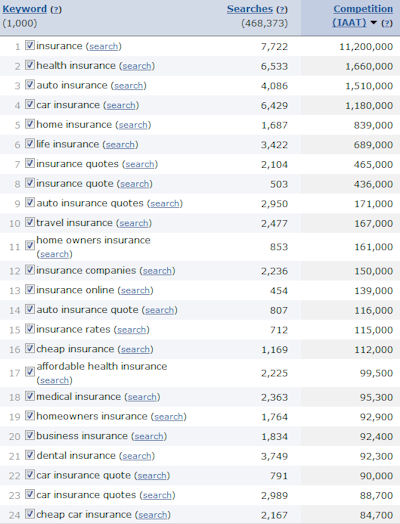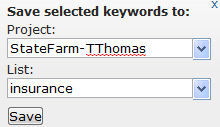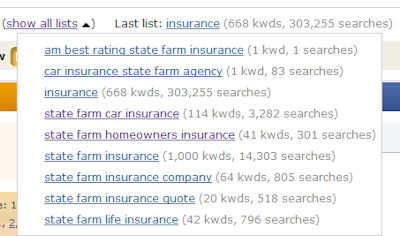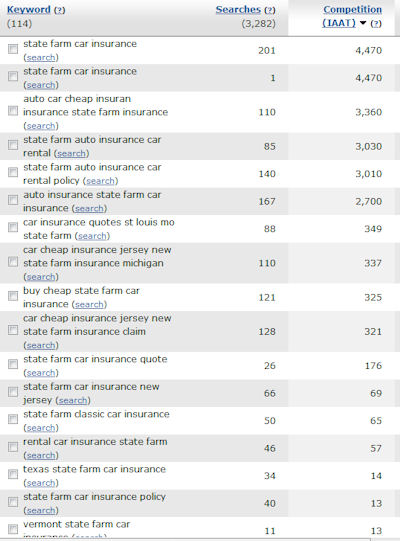Keyword Research can really be a challenge. What you want to do is find keyword phrases that have high enough search volume but have low competition. Why? Because it is much easier to end up with a page 1 ranking if the competition is not as fierce. This guide will show you how to evaluate keyword phrases using the Paid version of WordTracker.
Supplies Needed:
- WordTracker Subscription
- Computer with Internet Connection
- At least one Keyword Phrase
Step 1: Login
Login to your paid WordTracker account
Step 2: Create a New Project
Click on Create New Project and give your project a name. Click on the Project Name in the list of projects to access that project.
Step 3: Find Keywords
Click on “Find Keywords”. You can enter multiple keyword phrases but to ensure we don’t miss any profitable phrases, we are going to enter a somewhat generic phrase i.e. insurance. This will show you all searches that contain insurance, your “seed” keyword. Click on “Search”.
Step 4: Evaluate the Keyword Phrases
After clicking on Search, scroll down to review the list of keywords/keyword phrases that WordTracker found in its database.
Click on the Competition column to put those with the most competition at the top. Look for keywords that look promising. By that I mean look for keyword phrases that get lots of searches but don’t have lots of competition.
You’re probably wondering “How is the level of competition determined?” Well, WordTracker evaluates whether a page has that keyword phrase in the TITLE of the page itself and in the ANCHOR TEXT of at least one incoming link. In other words, a page is more competitive if it has “car insurance” in the title of the page AND sites are linking to it using that keyword phrase in their link. Anchor text is sometimes hard to control especially with unsolicited links but if the phrase is in the title of the page they are linking to, they’re more likely to use that. If someone links to your page using “Click Here” or something other than your keyword phrase, it’s ok to politely ask them to use your keyword phrase instead. Explain why and they will probably appreciate the lesson. It’s very important!
Note: You should still use keyword phrases that have high competition on your site if appropriate even if you probably won’t rank well for it today. Over time, you will acquire lots of incoming links, add lots of keyword-rich content, etc. and you may be able to climb up in the rankings.
Step 5: Tweak your results
Look at each of the phrases. Some of them may not apply to your business/niche so you can exclue them. In our example, insurance, perhaps you don’t sell health insurance. Type health into the “Select keywords containing:” box and click on Deselect. Repeat for each word or phrase you need to exclude. WordTracker gives you up to 1000 results so this could take quite some time.
NOTE: If you plan to export the results, this is more important. If you are going to do all your evaluating on the screen and the extraneous results won’t bother you, simply ignore them.
Step 6: Save
After deselecting all the keyword phrases you do not want to include, Save your project by clicking on Save. When you click on Save, a small box will popup asking you to choose the project and the list. The next step will teach you more about lists.
Step 7: Save and review alternate lists
Did you notice the (search) link to the right of each keyword phrase? If you click that link, you are given the option to save a search using that keyword phrase.
If you click on Search, a search is performed. If you click on “Search & Save”, you are presented with the Project/List popup so that you can save that search as a list.
Once you have created all the lists you want, you can review the keyword phrases in each list by clicking the “show all lists” link to the right of the Project name.
Let’s click on and review the list for the keyword phrase “state farm car insurance”.
Step 8: Review all your keyword data and decide which phrases to target first
Now, it’s time to really dig in and analyze your data. You'll need to decide what search volume is enough to bother with and how much competition is too much. This step is the hardest and I really can’t give you an A-B-C answer for this. It depends on your level of knowledge, level of commitment, etc.
However, this is where the rubber meets the road. My recommendation? Find several keyword phrases with high enough search volume that have low competition and several that have high competition. Go for it. You never know until you try. I wouldn’t start at the top of the list (sorted by competition) but find a few phrases that will present a challenge. You may surprise yourself!
Step 9: Use the keyword phrases as much as possible
Now that you’ve chosen your keywords, write content using the keywords frequently but do not keyword stuff. What is keyword stuffing? Repeating them way too frequently and stuffing them anywhere and everywhere you can put them. This is NOT good for search engine rankings and it’s definitely not good for your reader.
If you need any help with keyword research, please contact me and I will give you a quote. If you just have a basic question, feel free to paste it in the comments section below.
Check out “Blogging for Business”
It's just $39
Glennette Goodbread, Owner
Premium Web Design and Hosting
This post is part of the 30 Day Blogger Challenge and the Ultimate Blog Challenge.
Feel free to join us!







